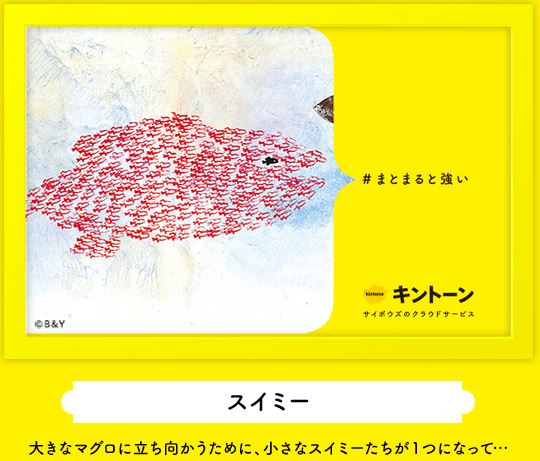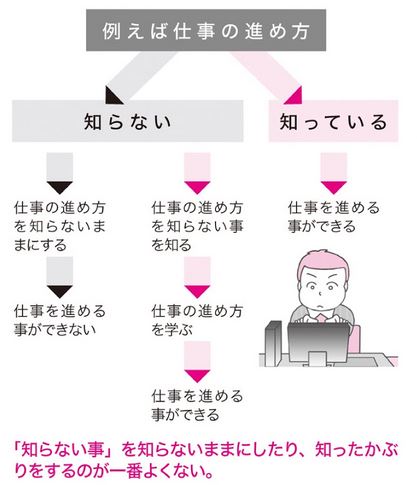Another blog post idea picked from a Tokyo metro advertisement. This time the point of focus in the advertisement is a one liner/idiom「#まとまると強い」 which focuses on improving workplace efficiency through team work.The advertiser here is advertising about the new cloud service they provide, which can be used by enterprises to integrate all their business applications onto a single cloud platform.

Commercial/Advertisement
The Japanese word for proverb is kotowaza(ことわざ). Another word which is close to the word kotowaza is idiom/kanyouku(慣用句). As per a strip of online article shown below, the difference between kotowaza and kanyouku is very little and hard to distinguish.
ことわざは会話の中で使うことで相手に意思をはっきりと伝えることができ、慣用句はその状況を分かりやすく表現しているので相手に状況を理解してもらいやすいです。しかし、こたわざと慣用句は明確な定義がなく、区別が難しく、その境界が曖昧です。
- 一つ一つは無力でも、まとまると強い(ひとつひとつはむりょくでも、まとまるとつよい)
“Unity is strength, division is weakness”
This is the complete idiom of the one liner mentioned above. It simply means “Unity is Strength”. The above advertisement tries to tell us that, similar to the small fishes coming together to outwit the huge one, even in the business world if every employee of an organization works towards a common goal and shares necessary information accordingly, an extraordinary outcome can be expected.
I would be listing a few of the proverbs and idioms which i have come across at work or online, of which a few may be useful to anyone in general or to those working in a Japanese environment and the remaining few may serve as a motivation factor. So, Let’s begin !
Proverbs
- 大事は小事より起こる(だいじはしょうじよりおこる)
“Big things often have small beginnings”
This proverb teaches us that a small leak can sink a great ship or in other words, even small faults, if left unattended, can have very serious consequences. This can be also used as a safety slogan at work place as this reflects the Heinrich’s findings of small incidents leading to major accidents.
- 石の上にも三年(いしのうえにもさんねん)
“Three years on a (cold) stone (will make the stone warm)”
This proverb gives us the message that everything comes to those who wait or in other words perseverance prevails. Be it workplace or life, one should never give up on one’s goals. Perseverance and patience will bring good results.
- 猫に小判(ねこにこばん)
“A koban/golden coin to a cat”
This proverb is appropriately used when you give something of value to someone who will not appreciate it or does not know the value of it.
- 雨垂れ石を穿つ(あまだれいしをうがつ)
“Constant dripping wears away the stone”
In other words, even a water drop if constantly hit onto a stone can create a hole. Similarly, even if a human puts his/her constant or continuous effort on a difficult task at hand, will become attainable. So this proverb teaches us that do not jump to conclusions or feel depressed that one is not capable of handling a job, instead cash on the power of constant effort to make things possible.
- 艱難汝を玉にす(かんなんなんじをたまにす)
“Adversity makes a man wise”
This proverb tells us that, by overcoming the hardships, a man can polish his personality thus making him a person of great character. Nowadays people choose easy paths to success by being within their comfort zone. However, as we live only once it would be more fulfilling to plan a certain path out of our comfort zone, overcome the hardships to realize our goals which will give us the true satisfaction and meaning to life.
- 他山の石(たざんのいし)
“A stone of another mountain”
This proverb literally means to polish one’s gems from a coarse stone of other mountains. In other words it just means to learn from other’s mistakes. At workplace the right usage of this proverb can be at a situation wherein we have to provide the examples of mistakes/faults which can be used as a reference for mitigation. Care should be taken to never use this proverb towards a client or senior.
- 知らざるを知らずと為す是知るなり(しらざるをしらずとなすこれしるなり)
“Confess your ignorance, and you will escape ignorance”

An Illustration @ Workplace
This proverb teaches us that, in case one has the knowledge/experience of handling a certain task, he/she can work efficiently on the assigned job as depicted on the right side flow in the above picture. However, if one becomes aware of the fact that he/she doesn’t know how to move ahead with the assigned task, they can learn the same by asking someone or getting trained on the topic and finally they will be in a position to handle the given task. The final flow on the left tries to explain the dangerous part ,i.e, if one is not aware how to move ahead with the task on hand and acts as if one has the knowledge or doesn’t do anything about that, he/she will never be in a position to handle the task and will face embarrassment going forward.
- 後の祭り(あとのまつり)
“To come after the fair has ended”
This proverb means “too late”. Even if you regret something, it’s too late, and it’s just a waste of time moping about it.
- 天は自ら助くる者を助く(てんはみずからたすくるものをたすく)
“Heaven/God helps those who help themselves”
The lesson we learn from the proverb is that, any challenging task might look difficult at the beginning. Here we have two paths, one is to give up or to keep trying. In such a situation, the one who continues with his hard work will be helped by god too is someway or the other. As per the sentence of a famous personality, “Efforts will certainly be rewarded, if it is not rewarded it only means that there is much more to be done” is to be noted.
- 仏の顔も三度まで(ほとけのかおもさんどまで)
“(If you touch) the Buddha’s face three times (even he will get annoyed)”
In short this proverb tries to tell us that, even the patience of a saintly person eventually runs out. No matter how good a person is, in case he is troubled time and again even he will not be the same.
Idioms
- 腹に落ちる(はらにおちる)
“To make sense/Fully understand the point”
The shortened version of this,「腹落ち」 or “haraochi” is quite frequently used at workplace and is used on behalf of the “understand” word. The usage scenario can be like, when the team lead is trying to explain his plan to the team members in-order to improve the productivity or the goal of the project and the team members after being convinced can use this word.
- 腹が立つ(はらがたつ)
“To get annoyed/To be furious”
This idiom can be at a situation where one is furious about something or someone or to describe a third person’s emotion as well.
- 自業自得(じごうじとく)
“As you sow, so you reap“
This idiom is used mostly in the case of a negative result only. When one doesn’t put in the efforts and fails at something, this idiom is appropriate to be used.
- 身も蓋もない(みもふたもない)
“Point blank/Too direct”
This idiom refers to the way of saying in which nothing is hidden or which is too direct and can be used to communicate to a person about one’s frank view about something or someone.
- 猫の手もかりたい(ねこのてもかりたい)
“I need every help I can get”
This idiom is used when one is too busy with something and would appreciate someone’s help.
- 一石二鳥(いっせきにちょう)
“Kill two birds with one stone”
This idiom is appropriately used when one activity led to double benefits.
- 馬が合う(うまがあう)
“To get along/Good compatibility”
This idiom can be used when one gets along with someone well or when the thinking and actions of people match.
- 水に流す(みずにながす)
“Let flow in the water”
Has someone done you wrong? Well, maybe you should remember this phrase, this expression is about forgiving and forgetting, instead of holding a grudge.
- 十人十色 (じゅうにんといろ)
“Ten men, ten colors”
In this idiom, “color” means character. Nobody has exactly the same character as others. If there are ten men, there must be ten different characters. This proverb tells that we must accept the differences of other people’s tastes.
- 足を洗う(あしをあらう)
“To wash one’s feet”
This idiom is appropriate for situations when one is separating from a disgusting association, getting rid of a bad habit or leaving a job.
Credits :
Experience
https://netsanyo.net/blog/1031
https://jpnculture.net/kotowaza-kanyouku/
http://www.hikarujinzai.com/entry/2015/08/30/195827
Others online articles

Leave a Reply